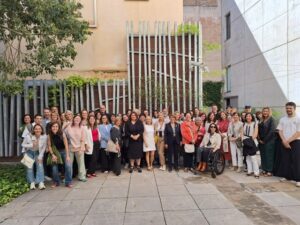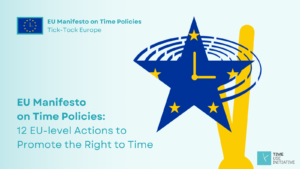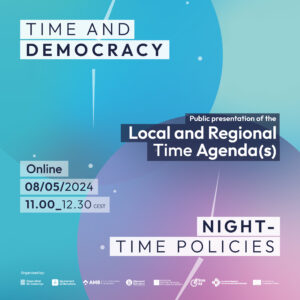Time Use Week started this Monday at 9:30 am at the Sant Pau Art Nouveau Site with a conversation between Carl Honoré, voice of the Slow movement, and Carla Estivill of the Estivill Sleep Foundation on how time affects our health and well-being and tips on how to live better.
Carl Honoré and Carla Estivill agreed on how the pandemic has been a double opportunity to reconnect with the relevant things of life and to gain more autonomy in our time. Carl has emphasized the importance of getting bored as a space for imagination and the promotion of creativity. He also highlighted the social aspect in the management of our time, starting from an individual change to become a more social and shared change, concluding with the quote “If you want to arrive quickly, go alone, but if you want to arrive away, go together”. Dra. Carla Estivill commented on the importance of following our biological clock for our health, highlighting the positive and negative aspects that technology can have when it comes to achieving this balance. Finally, she stressed the need to raise awareness throughout society (companies, schools, residences, etc.) to achieve a joint and healthier change for everyone.
Then, the five entities that co-organize Time Use Week inaugurated the week: Generalitat de Catalunya, Barcelona City Council, Barcelona Provincial Council, Barcelona Metropolitan Area, and the Barcelona Time Use Initiative.
Tania Verge, Councilor for Equality and Feminisms, commented that: “It is a key opportunity to connect the Catalan and international research and political ecosystem with uses of time and strengthen the leadership of Catalonia and its municipalities, as world referents of the right to time. We want and we will work for an organization of time in the key of gender equality with intersectional perspective, making the right to time a majority reality”.
Laura Pérez, Deputy for Social Rights, Global Justice, Feminisms and LGTBI of the Barcelona City Council, mentioned that: “Time use policies are key to reduce time poverty, which especially affects women and people with a more precarious economic situation”.
Montserrat Ballarín, vice-president of the Economic Development Area of the AMB, emphasized that: “Time Use Week and the IATUR Congress represent an opportunity for the Barcelona Metropolis to become the main world reference for healthy, equitable and productive time, which will benefit all citizens”.
Lluïsa Moret, Deputy for Equality and Social Sustainability of the Barcelona Provincial Council, concluded that “Cities are important actors in the leadership on time use policies , key to address strategic areas such as care, child and adolescent care and equal opportunities, mental health and emotional well-being or inclusive coexistence. Therefore, Time Use Policies have an essential role in the transformative projects that we promote from the Diputació de Barcelona. We have to put time policies back at the center of local action”.
Finally, Marta Junqué, co-coordinator of the Barcelona Time Use Initiative for a Healthy Society (BTUI): “In just two years, Time Use Week has become a key international week. This year, some 750 time policy experts will participate to showcase and share progress. Now, we must take action and push for clear global commitments to ensure the right to time for all citizens.”
The concept and organization of work is changing and the Time Use Week aims to be a meeting point to discuss, understand and look to the future of work. What new time-related rights do workers need? How to rethink the existing models of organization of working time to ensure decent work? The second session of Time Use Week dealt with highly topical issues such as teleworking or the right to digital disconnection, as well as the 4-day week.
Regarding this, the MEP Alex Agius says “The right to disconnect is basic for the future of work; it prevents unpaid overtime and also helps us to protect the mental health of workers, which is why we are preparing a specific Directive” .
Verónica Martínez Barbero, Director General of Labor of the Ministry of Employment, adds: “the law on remote work must avoid the reproduction of discriminations such as longer working hours, or to keep away from job promotion or to prevent the reconciliation of personal and professional life”.
Then, what should be the work model of the future? Toni Mora, from the Labor, Economic and Social Council of Catalonia (CTESC) also points out that it is necessary to consider all those unpaid actions that are part of our day : “Nowadays, we should not only take into account paid work but also care work, volunteer work, etc… everything is part of our day and our life”. One of the most discussed proposals these days has been the 4-day week. Charlotte Lockhart, promoter of the 4Day Week Global platform states that “this model is entirely possible and adaptable to different social and business realities around the world, with thousands of companies that have already introduced different formulas. Lockhart also encourages different companies and institutions to adopt models that answer the question of “what kind of work we want ” and states that “We have many reasons to rethink the current production model: family reasons, environmental reasons, productivity reasons.”
Camilla Kring points out the importance of taking into consideration the different chronotypes of the population when rethinking our uses of time: “The new time battle of today’s society is to adapt our work rhythm to our biological clock; we have different biological rhythms and we must adapt our working hours to our internal clock to have a healthy life”.
Chronobiology was very present in the third session of Time Use Week. The third session focused on the End Of DST: How can it be placed back in the european Agenda?
Maria Nikopoulou of the European Economic and Social Committee, has shown how Europe has promoted the project, but actions are needed from the Member States: “We have enough scientific data to address the end of the time change, but at the European level we need more time to make the decision, which involves many actors (…) We have an opportunity to bring the debate on the time change through the Citizens’ Debate on the Future of Europe and also through a popular citizens’ initiative”.
On the other hand, Ticia Luengo of the organization Better Times Platform and International Aliance for Natural Time has defended a change of strategy, which is not so much looking for European actions but to mobilize more local entities such as cities. “The vast majority has internalized the time change. It is an issue that we must address, communicating well and explaining the urgency of this situation, both to political actors and to the general population”.
Finally, Till Roenneberg, one of the world leaders in chronobiology, spoke of the negative impact on health of living in a time zone that is not aligned with the same biological clocks and the need to change terminology when talking about the subject: “The transition cost of implementing this model is minimal and the human benefits are high (…) we say that the time change is a cultural issue, but it is simply biology”.
The Time Use Week aims to connect public policies and research, that’s why international time use experts have defended the need for a European Academy for Time Policies. This is “a historical demand” as Ulrich Mückenberger of the German Society for Time pointed out, “with a fundamental pillar: The right to time.”
The objectives of this academy are to promote research, education and the exchange of good practices. Within this proposal, a gender institution would help to ensure some continuity in consolidating the study and implementation of time policies. Finally, both Ulrich Mückenberger and Jean-Yves Boulin have outlined three lines: raising public awareness of time policies, more real pilot tests in cities, and taking this debate to the European institutions. Connecting with the IATUR conference, Ignace Glorieux, president of IATUR, concludes: “The academy has an important role to play. As researchers we must provide evidence in all kinds of fields. We must be the basis for time use policies.”
Sara Berbel, CEO of the Barcelona City Council, emphasized the need to regulate all the changes that are impacting the uses of time, as well as the need to promote greater elaboration between researchers and public administrations: “the new ways of working imply new challenges related to time (teleworking, digital disconnection) and we must regulate them in order not to lose rights. The evaluation of these new challenges is essential and it makes sense to do – it in a global way.”
As a final conclusion, Ariadna Güell, co-coordinator of the BTUI, spoke of the relevance of collaboration between various study disciplines as well as the need for sponsorship, both financial and political: “The EATP should be be relevant to today’s issues, that is, climate emergency, so how can time policies support a just and green transition, care and gender differences, and with a big focus on what cities and metropolis can do”








